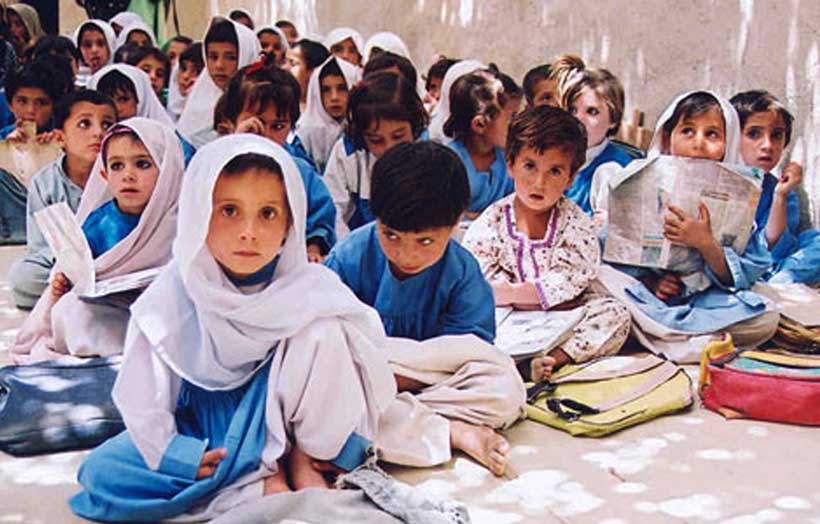
“Education is the most powerful weapon which you can use to change the world”
Anti-apartheid South African leader and late president Nelson Mandela had once inspired generations of his countrymen with these golden words.
Circa 2024 and many countries outside the Western world now invest heavily on education for empowering their new generations and building a stronger nation.
But Pakistan, which keeps on increasing its defence budget, is not among them. A recent report paints a gloomy portrait of a nation that is continuing to struggle economically.
The Planning Commission’s District Education Performance Index Report 2023 in Pakistan showed the country’s education system becoming completely dysfunctional.
The report revealed that youngsters were joining the not-so-promising job market of the country, struggling to contain rising inflation, with either no or very little knowledge.
The report blamed the state of the country’s fragile education mainly on insufficient public financing and poor-quality teaching.
The report also showed that governance and management of educational institutions in the South Asian country remained poor, mainly due to teacher shortages and high bureaucratic turnover.
Pakistan’s Dawn News published an Editorial on the report where it said it was alarming to see the country failing to provide quality education that can prepare its future workers for the challenges of the modern world.
“It bears repeating that without a sufficiently educated and trained workforce available to power the engine of Pakistan’s economy, there will be no ‘prosperous tomorrow’,” the Editorial said.
The Pakistani daily further warned that the economy will continue to be weighed down by the burgeoning population unless labour force productivity is increased manifold.
The newspaper said both the provincial and federal governments should prioritise public financing for education.
Another leading Pakistani daily The Express Tribune voiced a similar opinion when in the Editorial titled ‘Education Crisis’ pointed out that there are approximately 26.2 million children out of school in the country.
“We need to increase the number of schools, teachers and classrooms; overhaul our assessment and examination systems; update our curricula and textbooks; enhance the teaching skills and content knowledge of educators; and improve governance structures in the public sector,” the editorial said.
The newspaper demanded a prompt utilisation of all these measures to fix the nation that battled political instability for several years.
It is ironic today that it was Pakistan which was one of the first countries to ratify the Convention on the Rights of the Child in 1990, guaranteeing education under Article 28.
As discussed before, over 26 million children of school-age are out of school in Pakistan, comprising 10 per cent of all out-of-school children globally, a data which itself shows the lack of importance which the government is paying to enhance the skill of its future generations who are expected to drive the country from its present state of embarrassment where it has to depend on IMF bailout to float on the tides of uncertainty.
According to an article on ResearchGate titled “Falling Standard of education in Pakistan: Who will tie the bell?” authored by Muhammad Afzal and Fazli Qadir, major causes of weakening of education standard include low enrolment and high dropout rate at the primary level, different standards of education, meagre budgetary allocation for education sector, political interference and low quality of curricula and textbooks.
It also highlighted fast growth of population, poverty and unemployment, and substandard evaluation system, besides serious financial and management problems, wide disparities between regions and genders and the poor physical infrastructure.
“Doctors and engineers appear in competitive examinations because they do not find jobs in the public or private sector. This is the most agonizing dilemma of Pakistan education… “ the authors said. Writer Abdullah Fadil, UNICEF Representative in Pakistan, wrote: “The country may actually have the largest number of children out of school globally. Most of these children are girls; the underprivileged; those living with disabilities; and children in hard-to-reach areas.”
“Even when children do go to school, 77 per cent of them are not able to read and understand a simple text by the age of 10. At a time when investment in education should be increasing, it is decreasing. In 2019, it was 2.3 per cent of the GDP. But for 2023-24, it is 1.7 per cent,” he said.
He urged the government to make smart investments in education.
“Before the children of Pakistan sue us all for denying them one of their fundamental rights, let us get them in school and learning – a start to build the productive and prosperous Pakistan we all want to see,” he said.
It is ultimately the Pakistani government which needs to rise up and start working on ways to rejuvenate the ramshackle education system and infrastructure.






